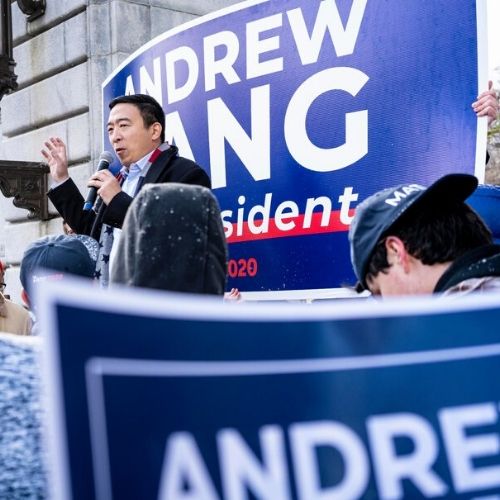
“The opposite of Donald Trump is an Asian man who likes math.”
“I’m Asian, so I know a lot of doctors.”
“Many of you think this is impossible, that the Asian man is talking magic.”
“[My resting face is just] Asian stoicism.”
These are just some of the quips presidential candidate Andrew Yang has said about his Asian American identity. His entrance into the presidential stage was somewhat one akin to a dark horse; in spite of his lack of name recognition compared to notable politicians such as Cory Booker, Yang has eclipsed Booker and candidates Tom Steyer, Amy Klobuchar, and Tulsi Gabbard at four percent.
Furthermore, in the Politico poll for the week of December 7, 2019, the second most popular candidate is Bernie Sanders at 22%. However, within that 22%, Sanders supporters’ second choice includes Andrew Yang, indicating his success in capturing young, progressive-minded people of color, a group that is poised to become a powerful and vital voting bloc for the 2020 presidential election.
It is no doubt a watershed moment in American history for an Asian American to come so far, especially when Asian Americans are so underrepresented in U.S. politics with only 2.2% in Congress. So, what are the implications of one of the only Asian American political figures poking fun at his identity?
For one, these seemingly harmless, self-deprecating punchlines are remnants of a more serious and poignant time for Asian Americans. For example, in Joon K. Kim’s “California’s Agribusiness and the Farm Labor Question,” he recounts G.W. Pierce, president of the California Almond Growers Association in 1918, saying that “the Japanese as employees in orchard work are becoming less desirable than formerly . . . When they decide to acquire any given property, they decline to become employees in that particular business. Rather than our servant, he is our competitor.”
This is in reference to native-born Japanese American citizens who have already tended the land for a few generations. Lawmakers affirmed such fears of an “Asiatic invasion” based on such anecdotes with immigration bans, repatriation, and mass deportations of Asian Americans. The historical racism against Asian Americans is buried in Yang’s jokes illustrating Asians as calculated and cunning, yet one dimensional and unemotional; race cannot be disentangled, as Asians are perpetually seen as the “other.” Do Asians want a candidate who wants to put a strategic proximity between his Asian identity and his American identity to seem non-threatening to the white electorate?
Now, even if it wasn’t that deep, Yang seems to flaunt his Asian identity everywhere but his policy. His Freedom Dividend ($1000/mo.) doesn’t seem to matter when healthcare costs upward of several thousand dollars. For example, in a study conducted by Lee, Hsu, and Robinson called “Barriers to Healthcare Access in 13 Asian Americans Communities,” it is reported that “80% of Cambodians suggested that cost was a barrier to seeking mental health services,” in reference to out-of-pocket payment for care.
Thus, the stakes are high with Asian American voters, who have historically been undermobilized as campaigns don’t target voters with a lack of voting history. This may be because many Asian Americans are recently naturalized immigrants (as much as 59% of the entire Asian population are immigrants), or they’re still acclimating to the U.S. political process. So, campaigns don’t reach out to them because they’re considered “low propensity” voters not because they have deliberately chosen to opt out of the political process, but because they have not had the chance to vote yet.
According to APIA Vote, compared to the national average of 53%, only 31% of Asian Americans report being contacted by candidates in 2012. It doesn’t help that Asian Americans have one of the lowest voter turnout rates; in the 2010 midterm, the Asian American voter turnout trailed at 31% to blacks’ 44% and whites’ 49%.
If campaigns recognized Asian Americans as a powerful electorate and galvanized them to vote, would they vote for Andrew Yang?

Comments are closed.